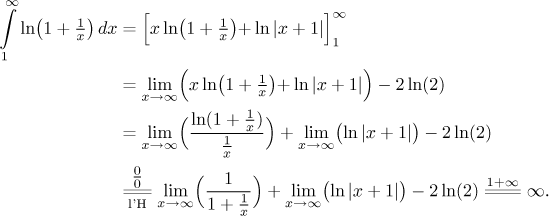Problem: Investigate convergence of the following series. (Does it converge? If it does, then how?)
![]()
Solution: We have to check on convergence of the given series and
also on its absolute convergence. We start with the former. The given
series looks like it is
alternating, but to
confirm it we have to check that the logarithmic part is always positive.
This is easy, for positive integers k the argument
Thus we indeed have an alternating series and we can try to use the Alternating series test. The numbers
bk = ln(1 + 1/k)
form a decreasing sequence of positive numbers that goes to zero. By AST, the given series converges.
Now we will check on absolute convergence. We know that the logarithm is positive, so we have
![]()
We start with the Ratio test.

We have
What other test could help? We could try the
Integral test, since the function

Now we pass to the appropriate improper integral. The limit will involve indeterminate product, we will handle it in the standard way.

Since the integral diverges, also the series we investigate diverges, therefore the given series does not converge absolutely.
We determined that the series itself converges, but it is not absolutely
convergent.
Conclusion: The given series is conditionally convergent.
We return to the series with absolute values and for the sake of
completeness we will look at
comparison tests. The only
obvious estimate of logarithm is by a constant from above, say
An easier question is this: When x is positive and very small, how
does
When we use it in our case, we get a limit comparison that has to be confirmed.

Our guess was justified, therefore we also have
![]()
This confirms that the given series is not absolutely convergent. Incidentally, the series on the right is the harmonic series whose divergence is well-known, for instance by the p-test.